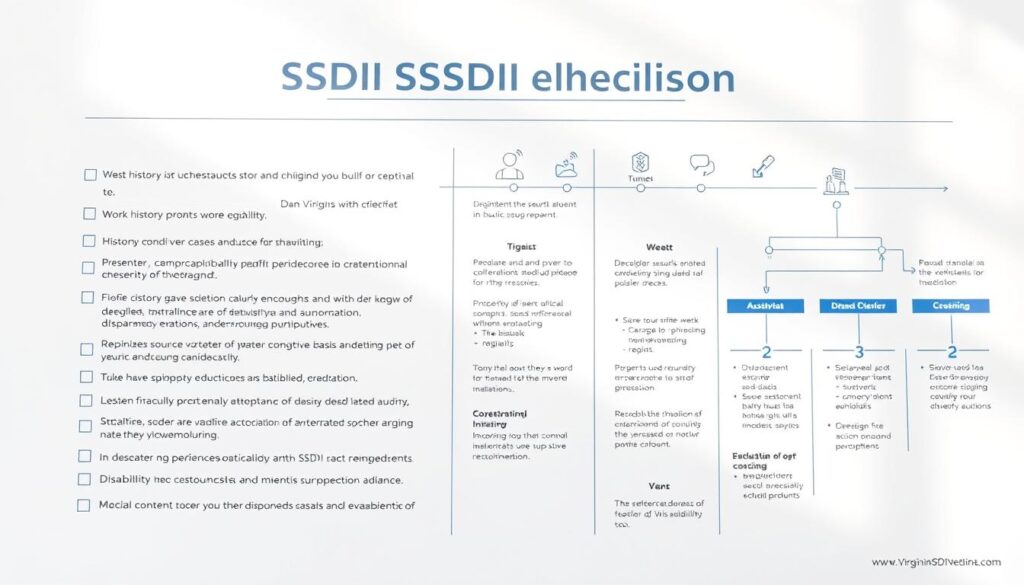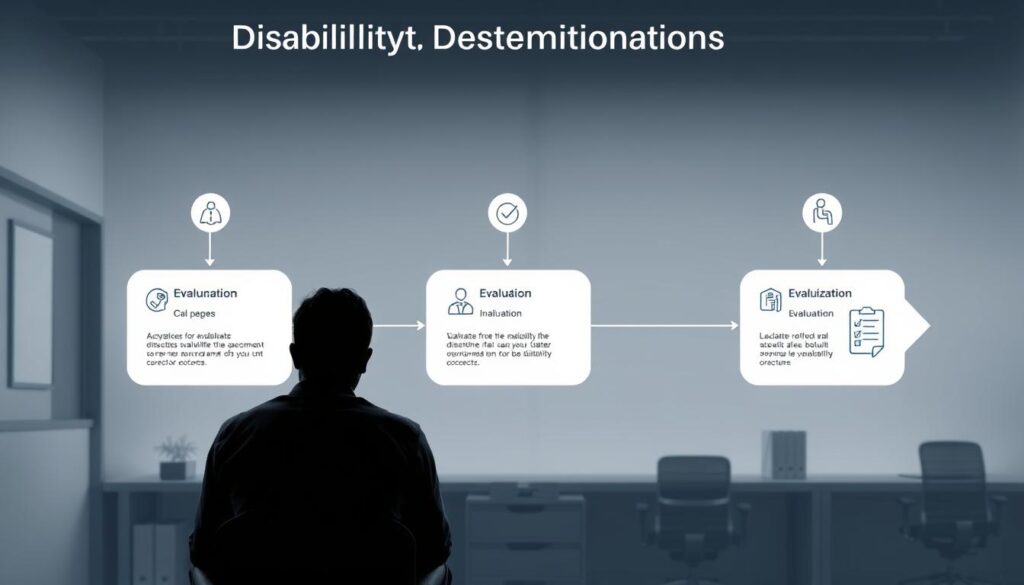Advanced Disability Benefits Estimator
Discover Your Potential Benefits
Are you curious about what disability benefits you might qualify for? Let's find out together!
For residents of West Virginia unable to work due to a medical condition, understanding the qualifying conditions for disability benefits is crucial.

The SSA oversees two primary disability programs, each with specific requirements that applicants must fulfill. Navigating this complex process demands knowledge of both medical and technical qualifications that determine eligibility for benefits.
This comprehensive guide will walk you through the qualifying conditions, application process, and benefits amounts for disability programs. By covering medical requirements to work history considerations, we aim to help you determine if you qualify for the support you need.
Understanding Social Security Disability Programs
Navigating the complexities of disability benefits requires understanding the two primary programs managed by the Social Security Administration.
The Social Security Administration (SSA) is responsible for two main disability programs: Social Security Disability Insurance (SSDI) and Supplemental Security Income (SSI). These programs are designed to provide financial assistance to individuals who are unable to work due to a disability.
Social Security Disability Insurance (SSDI)
SSDI is a federal program that provides benefits to workers who have paid into the Social Security system through payroll taxes but are no longer able to work due to a qualifying disability. Eligibility for SSDI is primarily based on an individual’s work history, with specific requirements for recent work and the duration of work, which vary depending on the age at which the individual became disabled.
Supplemental Security Income (SSI)
SSI, on the other hand, is a needs-based program that provides financial assistance to individuals with limited income and resources who are disabled, blind, or aged 65 and older. Unlike SSDI, SSI does not require a work history, but applicants must meet strict income and asset limitations to qualify.
| Program | Eligibility Criteria | Benefits |
|---|---|---|
| SSDI | Work history, qualifying disability | Benefits for the individual and certain family members |
| SSI | Limited income and resources, disability or aged 65+ | Financial assistance for basics like food, clothing, and housing |
It’s worth noting that some individuals may be eligible for both SSDI and SSI, known as “concurrent benefits,” if they meet the respective eligibility criteria for both programs.
Medical Qualifications for Disability Benefits
Medical qualifications play a pivotal role in determining eligibility for disability benefits under the Social Security Administration’s programs. To qualify, applicants must meet the SSA’s strict definition of disability.
SSA’s Definition of Disability
The Social Security Administration defines disability as the inability to engage in substantial gainful activity due to a medically determinable physical or mental impairment that has lasted or is expected to last at least 12 months or result in death. This definition is crucial in determining whether an individual’s condition qualifies them for disability benefits. Unlike some programs, Social Security does not provide benefits for partial or short-term disability, focusing instead on total disability cases.
Common Qualifying Medical Conditions
In West Virginia, the most common qualifying conditions for disability benefits include musculoskeletal disorders, mental health conditions, and neurological disorders. The prevalence of these conditions among disability claimants highlights the importance of thorough medical documentation in the application process.
| Condition Category | Prevalence in West Virginia |
|---|---|
| Musculoskeletal Disorders | 33.4% |
| Mental Health Conditions | 29.7% |
| Neurological Disorders | 8.5% |
Medical evidence is crucial to proving a disability claim, including detailed documentation from healthcare providers about diagnosis, treatments, and limitations. The condition must not only be medically documented but must also significantly limit the ability to perform basic work activities.
Social Security Disability Insurance West Virginia Eligibility Requirements

Understanding the eligibility requirements for Social Security Disability Insurance (SSDI) in West Virginia is crucial for those seeking benefits. To qualify, applicants must have a sufficient work history and have paid Social Security taxes.
Work Credits and History Requirements
The SSDI eligibility criteria include accumulating work credits through employment where Social Security taxes were paid. In 2025, one credit is earned for each $1,810 in wages or self-employment income, up to a maximum of four credits per year. Generally, applicants need 40 credits, with 20 earned in the last 10 years, to qualify.
Most applicants must have earned 40 total work credits, with 20 of those credits earned in the 10 years immediately before becoming disabled, known as the 20/40 rule. Younger workers may qualify with fewer credits.
Age Considerations for SSDI Eligibility
Age significantly impacts SSDI eligibility, as the SSA has different evaluation criteria for applicants under 50, 50-54, 55-59, and 60-66 years old. Older workers face more lenient standards, making it easier for them to qualify.
The number of work credits needed varies by age, with younger workers requiring fewer credits than older workers to qualify for SSDI benefits.
SSI Eligibility Requirements in West Virginia
Eligibility for Supplemental Security Income (SSI) in West Virginia is primarily based on financial need. To qualify, applicants must have limited income and resources. The program is designed to support individuals who are disabled, blind, or elderly and have limited financial means.
Income Limitations
SSI income limitations consider both earned income (wages) and unearned income (such as other benefits, interest, or gifts). The maximum federal SSI payment in 2024 is $943 per month. However, the average payment in West Virginia is approximately $620.09 due to income reductions. The SSA subtracts any income from the monthly maximum, impacting the benefit amount.
Asset Restrictions
Asset restrictions limit individual applicants to $2,000 and married couples to $3,000 in countable resources. Certain assets, like a primary home and one vehicle, are typically excluded from these calculations. Understanding these restrictions is crucial for determining eligibility for SSI benefits in West Virginia.
The 5-Step Disability Determination Process
To qualify for disability benefits, applicants must navigate the SSA’s 5-step disability determination process. This sequential evaluation is designed to assess whether an individual’s condition prevents them from engaging in substantial gainful activity.
Current Work Activity Assessment
The first step assesses whether the applicant is currently working and earning above the substantial gainful activity (SGA) threshold. In 2025, this threshold is $1,620 per month, or $2,700 for blind individuals.
Severity of Medical Condition
The second step evaluates the severity of the applicant’s medical condition, requiring that it significantly limits their ability to perform basic work activities for at least 12 consecutive months.

Meeting the List of Impairments
The third step checks if the applicant’s condition meets or equals a listing in the SSA’s List of Impairments, which includes conditions considered severe enough to automatically qualify for disability benefits.
Ability to Perform Past Work
The fourth step analyzes the applicant’s ability to perform their past relevant work, considering their residual functional capacity.
Ability to Perform Any Type of Work
The final step assesses whether the applicant can perform any other type of work available in the national economy, taking into account their age, education, work experience, and residual functional capacity. Disability Determination Services (DDS) makes the medical decision based on this comprehensive evaluation.
How to Apply for Disability Benefits in West Virginia
The process of applying for disability benefits in West Virginia is accessible and can be done in several ways. To begin, it’s essential to understand the requirements and the methods available for submission.
Required Documentation
Gathering comprehensive documentation is the first step in the application process. This includes detailed medical records, treatment history, medication lists, and laboratory test results. Additionally, applicants need to provide contact information for their healthcare providers and extensive details about their work history, including job titles, duties, dates of employment, and salary information for the past 15 years.
Application Methods
West Virginia residents have multiple options to apply for disability benefits. They can apply online through the Social Security Administration’s website, which allows for a convenient “apply online” process. Alternatively, applications can be submitted over the phone by calling 1-800-772-1213, or in person at one of the local SSA offices throughout the state. The application process typically takes 1-2 hours to complete, and it’s advisable to have all required information readily available.
What Happens After You Apply
After submitting your Social Security Disability application, the waiting game begins, with several steps involved before a decision is made. The process involves verifying your technical eligibility and evaluating your medical condition, which can be lengthy.
Application Processing Timeline in West Virginia
The initial decision process in West Virginia takes an average of 6.1 months. During this time, the SSA verifies your technical eligibility while Disability Determination Services evaluates your medical condition. The SSA may request additional information or a consultative examination with an SSA-approved doctor to gather more evidence about your condition.
| Stage | Average Time in West Virginia |
|---|---|
| Initial Decision | 6.1 months |
| Reconsideration | 6.1 months |
| Hearing with Administrative Law Judge | 13.7 months |
Appeals Process for Denied Claims
If your initial application is denied, which happens to approximately 70% of applicants, you have 60 days to file for reconsideration. Should your reconsideration be denied, the next step is requesting a hearing before an administrative law judge. The hearing stage offers the best chance of approval, with more than half of applicants who reach this stage winning their benefits, especially those represented by an attorney.
Disability Benefit Amounts in West Virginia
The amount of disability benefits received by individuals in West Virginia can vary significantly based on the type of program they are enrolled in. The two primary programs, Social Security Disability Insurance (SSDI) and Supplemental Security Income (SSI), have different calculation methods for determining benefit amounts.
Average SSDI Payments
For SSDI recipients in West Virginia, the average monthly payment is $1,344.70. However, individual benefit amounts can range from a few hundred dollars to the maximum monthly benefit of $3,627 in 2023. The SSDI benefit amount is based on the individual’s lifetime average earnings covered by Social Security.
Average SSI Payments
In contrast, SSI payments are more standardized. The federal maximum monthly payment for SSI in 2024 is $943, but the average payment in West Virginia is $620.09 per month. This variation is due to adjustments based on income and resources.
| Program | Average Monthly Payment | Maximum Monthly Payment |
|---|---|---|
| SSDI | $1,344.70 | $3,627 (2023) |
| SSI | $620.09 | $943 (2024) |
Conclusion
For individuals struggling with disabilities in West Virginia, securing Social Security Disability benefits can be a vital lifeline. To qualify, applicants must meet specific medical and technical criteria that prove their inability to work due to a severe, long-term medical condition.
Understanding the differences between SSDI and SSI programs is crucial, as eligibility is determined by work history, income, and assets. The application process is complex and often involves multiple stages of appeal.
Working with an experienced disability attorney can significantly increase the chances of approval, especially at the hearing stage. While waiting for benefits can be challenging, approved applicants receive back pay and monthly benefits, providing crucial financial support.
